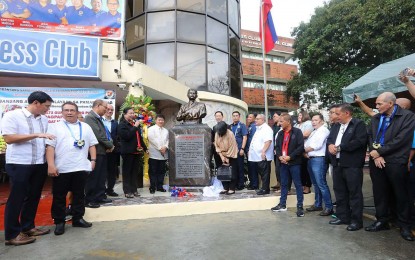
FATHER OF PH JOURNALISM. Officials of the National Press Club and Maria Rita Marasigan-Aguas lead the unveiling of the bronze bust of Gat Marcelo H. Del Pilar at the National Press Club grounds in Intramuros, Manila on Wednesday (Aug. 30, 2023). Marasigan-Aguas is the great granddaughter of Del Pilar, described as father of the Philippine journalism. (PNA photos by Yancy Lim)
MANILA – The unveiling of bust of Marcelo H. Del Pilar on his 173rd birth anniversary and on the first anniversary of the country’s Press Freedom Day on Wednesday is the most appropriate homage to his huge contribution to Philippine journalism.
"I believe that this latest tribute as mandated by national government via Republic Act (RA) 11699 to Marcelo H. Del Pilar’s legacy in declaring Press Freedom Day to coincide with Marcelo H. Del Pilar’s birth anniversary is a most appropriate homage and a testament to the undeniable impact Marcelo H. Del Pilar’s life and works have had on Philippine journalism, his fellow countrymen and his country," Maria Rita Marasigan-Aguas said during the unveiling of the bronze bust of Del Pilar at the National Press Club (NPC) grounds in Manila.
Marasigan-Aguas is Del Pilar's great granddaughter. Her father, Marcelo Del Pilar Marasigan, is the youngest of the six children of Anita Del Pilar who is the youngest child of the “Father of Philippine Journalism”.
She said all three labels describing her great grandfather as Father of Philippine Masonry, Great Propagandist and Father of Philippine Journalism are “tributes to the manner in which he unwittingly set the principles and standards of exceptional journalism even before there were really any existing much less established.”
“This, while performing acts of heroism at the same time," she added.
She noted that journalist’s work is typified by adversity especially in developing nations and during a fight for a worthy cause "against the interests of powerful people or conglomerates as enemies or even just the status quo."
"It is a job which necessarily demands high ethical standards and level of performance in order to deliver on outcomes which are factual, objective and of optimal value and real service to the society to which he or she belongs, or they belong," she added.
Among Del Pilar's foremost ideals include equality -- equality of footing of Filipino vis-a-vis another Filipino or any person from another race, equality of all people in the eyes of the law, and liberty “which even then did not have a Tagalog word equivalence.”
“May the ideals Marcelo H. del Pilar fought for and sought to uphold inspire in every Filipino journalist to uphold the high standards of the journalistic practice inherently expected from the practitioners of this profession,” Marasigan-Aguas said.
“After all, succeeding Filipino journalists after our father of Phil journalism are effectively either or both beneficiaries and/or successors to the vital obligation of upholding and carrying out the principles of journalism like a true professional in any self-respecting society,” she added.
In 1882, Del Pilar founded the Diariong Tagalog which is a patriotic newspaper in Tagalog and Spanish published during the Spanish occupation of the Philippines. It published articles urging government reform and denouncing the abuse of the Spanish friars.
Due to tensions between him and the Spanish friars, Del Pilar left for Barcelona and joined the organization of expatriate Filipinos.
He later became the editor of La Solidaridad, a bi-weekly newspaper which expressed political reforms, liberty of Filipinos to participate in government affairs, and freedom of speech and of the press.
Del Pilar died in Barcelona, Spain on July 4, 1896, a month before the Cry of Pugad Lawin which prompted the Philippine Revolution.
In his video message, Senator Bong Revilla, principal author of RA 11699 that declared Aug. 30 as Press Freedom Day, urged media practitioners to remain the vanguard of true journalists.
“Pinili natin ang Agosto 30, para isabay ang selebrasyon ng kapanganakan ng Father of Philippine Journalism na siyang nagtatag ng Dyaryong Tagalog at kalaunan naging patnugot ng La Solidaridad at tulad niyo nagin bahagi siya ng katotohanan, bumatikos ng mga katiwalian, at kahit ao nabatikos lagi niyo akong kaisa para isulong ang malayang pamamahayag (We chose August 30 to coincide the celebration with the birthdate of the Father of Philippine Journalism who published Dyaryong Tagalog and edited the La Solidaridad. Just like you, he became a part of the truth against wrongdoings, and even I was lambasted. I am with you to push for the freedom of the press)," Revilla said.
NPC president Lydia Bueno and fellow officers joined the celebration and recognized the big contribution of Del Pilar in press freedom in the country, urging media practitioners not to abuse it.
Philippine Information Agency (PIA) Director General Jose Torres, Presidential Task Force on Media Security (PTFOMS) Executive Director Paul Gutierrez, both former officials of the NPC, also noted the role of del Pilar.
National Information Bureau (NIB) Director Louie Morente, also an NPC member, said the current generation of media men must follow the ideals of del Pilar. (with reports from Leonel Abasola/PNA)
